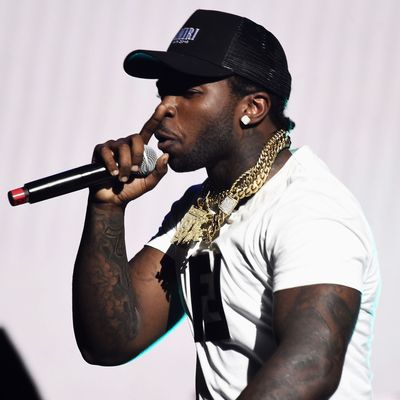
On February 19, 2020, New York rapper Pop Smoke was killed in his Los Angeles rental house during a home invasion. He was just 20 years old. The up-and-coming performer, née Bashar Barakah Jackson, was among the leaders of Brooklyn’s drill movement.
As police investigated Pop Smoke’s death, internet investigators forged their own hypotheses about what happended, sowing confusion over his murder. Authorities struggled to find a motive, as many witnesses were unreliable or uncooperative, TMZ reported on February 29. Jonathan Tippet, a captain with the Los Angeles Police Department’s Robbery and Homicide Division, reportedly told the Los Angeles Times that he was “not comfortable calling it a robbery right now.”
Meanwhile, Pop Smoke’s fans and web sleuths pointed out that he had posted photos on social media showing lots of cash, as well as a luxury car and designer goods. He had also put up posts on Facebook and Instagram with pictures of designer bags; the complete address of the rental was visible on the packaging. Mike “Dee” Durodola, Pop Smoke’s friend, also posted at least one photo in which the address could be partially seen in the background — spurring some fans to accuse him of setting up his confidant. Derodulo, who was reportedly at Pop Smoke’s rental during the deadly shooting, slammed those allegations, writing on Instagram: “I WOULD NEVER IN MY LIFE SET MY BROTHER UP.” Cops also probed whether Jackson’s death was related to his possible involvement with the Crips.
On July 9, 2020, the Los Angeles Police Department announced that it had arrested five people in relation to Pop Smoke’s murder. Four days later, prosecutors announced that four of them were charged in Pop Smoke’s slaying: Corey Walker, 19, Keandre Rodgers, 18, and two minor teens whose names haven’t been released because of their age. (The fifth suspect who had been arrested ultimately wasn’t charged in Pop Smoke’s death, but was implicated in an “unrelated string of shootings” earlier that year, according to the Los Angeles Times.) Although the suspects were in an L.A. gang, police sources cited by TMZ said they didn’t think the crime was linked to Pop Smoke’s potential gang ties, given that he was from New York City, nor part of a potential East Coast–West Coast dispute.
Nearly a year later, new details about Pop Smoke’s murder emerged in court last week, during two days of proceedings to determine whether the case against Walker would go to trial. Here is what we learned about Jackson’s death from these proceedings.
Pop Smoke’s alleged killer was only 15 years old.
According to the New York Daily News, Los Angeles Police Department detective Carlos Camacho said that Pop Smoke was fatally shot by the 15-year-old suspect. The teens involved in Pop Smoke’s death were allegedly at his rental to steal his diamond-encrusted Rolex and Cuban-link chain. They only wound up stealing Pop Smoke’s watch and later sold it for a mere $2,000, per the report.
The accused shooter, who faces murder and robbery charges, allegedly “admitted that they asked for the jewelry” and then got into “a confrontation” with Pop Smoke, Camacho said. “They got into a fight, and he shot [Jackson] three times,” Camacho claimed. “[The accused] said he shot him on the back.” These revelations came in a “recorded” jailhouse interview between the teen and his cellmate in May 2020, the New York Daily News said.
Walker allegedly admitted to his role in Pop Smoke’s murder.
The New York Daily News also reported that Corey Walker copped to his role in Pop Smoke’s death during a surreptitiously recorded conversation with an informant who was put in his jail cell. Walker, who has pleaded not guilty, allegedly told this informant that the robbery crew sported ski masks and gloves and used a police scanner to carry out their plan, in an effort to avoid being caught. Police testified that the four suspects in Pop Smoke’s killing were all in the same street gang and only found out about where the rapper was from his Instagram posts.
Pop Smoke fought back.
Walker also told the informant that when the robbery crew arrived at Pop Smoke’s rental, they “confronted” him when he was in the shower, according to Camacho’s testimony. Walker purportedly recounted that the teens demanded Pop Smoke hand over his jewelry, which he had on in the shower.
The teen robbers remarked “Thank you” when it seemed like Pop Smoke would comply, Walker allegedly said in his chat with the informant. However, Pop Smoke ultimately fought back against the robbers, at which point the intruders “pistol-whipped” him. The shooter proceeded to open fire, hitting Pop Smoke in the chest, according to Camacho’s account of Walker’s alleged confession.
Pop Smoke’s companion gave details to police.
The New York Daily News, citing another detective’s testimony, reported that a woman who was with Pop Smoke told cops that “masked men stormed through the curtains of a second-story balcony.” Los Angeles Police Department detective Christian Carrasco testified Thursday that one assailant allegedly put a gun against the woman’s forehead while the other suspects burst into the bathroom where Pop Smoke was showering. “Shut the fuck up. Do you want to die?” Carrasco said, citing the woman’s statement to police.
“She heard a struggle coming from the shower area and heard Mr. Jackson screaming. Mr. Jackson ran out of the bathroom and then she heard a loud pop and [heard] Mr. Jackson fall to the ground,” the New York Daily News quoted Carrasco as saying.
Police spoke with this woman “several hours” after Pop Smoke’s fatal shooting, the newspaper said.
Pop Smoke was kicked by his attackers.
Carrasco, the first witness in last week’s proceedings, said that Pop Smoke was also kicked after being shot, according to the female companion. “Two other individuals began to kick him,” the New York Daily News quoted Carrasco as saying. “Mr. Jackson gets up and run downstairs. She hears two more pops. She follows Mr. Jackson, sees him on the ground and screams for Michael [Durodola] to call 911.”
Walker’s car allegedly links him to the murder.
Los Angeles Police Department detective Frank Flores testified Thursday that surveillance video tied Walker to Pop Smoke’s killing. The tape showed an Infinity bringing the suspects to the scene, the New York Daily News reported Flores saying, and the license-plate number was traced to Walker. Walker had “been stopped in it for an unrelated matter prior to the murder,” the newspaper said. (It’s unclear when.)
Walker insists he wasn’t in Pop Smoke’s rental.
Christopher Darden, Walker’s defense lawyer, said in court Friday that Walker never stepped foot in Pop Smoke’s home but instead remained in his car, and urged the younger suspects not to open fire, per the New York Daily News. “He’s clearly not an aider and abettor of premeditated murder,” said Darden, who was famously a prosecutor in the O.J. Simpson murder trial. “At most, he’s a principal in a robbery … He’s a driver. He is outside.” Darden made this claim in an effort to get Walker’s murder charge dropped.
Prosecutor Hilary Williams insisted that Walker had surveilled Pop Smoke’s residence hours before the deadly robbery. Walker was also aware that the other suspects were plotting to rob Pop Smoke at gunpoint, Williams argued. “They specifically target this house wanting this victim to be there,” Williams said, claiming Walker had a “reckless indifference to human life.” Darden previously told the newspaper, “Our position is that Mr. Walker didn’t kill anybody,” and that his client was a fan of Pop Smoke.
Walker’s case will proceed.
The judge overseeing Walker’s case, Clay Jacke II, rejected Darden’s argument to reduce the charges. Jacke determined there was “sufficient cause” for Walker to go to trial. He will be back in court on June 3 for “rearraignment,” the New York Daily News said. If Walker is convicted on his current charges, he potentially faces the death penalty. No trial date has been set for Walker. The other suspects are awaiting trial in juvenile court, the L.A. District Attorney’s Office told Vulture.
Although Rodgers was listed as 18 at the time of his arrest, his lawyers previously pointed out that various government documents listed him at different ages, and argued that he was actually a minor during the crime, according to Complex. A judge ultimately determined that there was sufficient evidence to certify him to juvenile court because he was a minor at the time of the crime, the L.A. District Attorney’s Office said.


